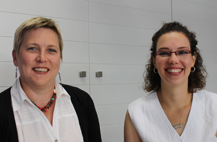Latest News Archive
Please select Category, Year, and then Month to display items
14 November 2024
|
Story André Damons
|
Photo André Damons
 Staff members from the Directorate Research Development (DRD) at the University of the Free State; Palesa Mgaga, second from right, Tebogo Machethe, centre, and Charelise van Staden, second from right, were thanked for hosting the launch of the Khoebo Innovation Promotion Programme. They are pictured with colleagues from the IDC’s Samkelisiwe Mtsewu, left, and Thato Mogopodi, far right.
Staff members from the Directorate Research Development (DRD) at the University of the Free State; Palesa Mgaga, second from right, Tebogo Machethe, centre, and Charelise van Staden, second from right, were thanked for hosting the launch of the Khoebo Innovation Promotion Programme. They are pictured with colleagues from the IDC’s Samkelisiwe Mtsewu, left, and Thato Mogopodi, far right.
The University of the Free State (UFS), represented by the Directorate Research Development (DRD), played host to the Department of Trade Industry and Competition (dtic) and the Industrial Development Corporation (IDC) for the launch of its Khoebo Innovation Promotion Programme (KIPP).
The launch took place on 5 November in the Sasol Library on the Bloemfontein Campus. Tebogo Machethe, Director: Research Contracts and Innovation at the DRD, said its role was to expose the university researchers to different opportunities and programmes for funding from the IDC and the dtic. It also allowed the researchers to engage potential funders in order to understand what funders look for in a project when considering funding it.
“The aim of IDC KIPP is to assist local entrepreneurs and small to medium enterprises with commercialisation funding. The KIPP offers capital and business support to SMMEs during the early stages of commercialisation with particular emphasis on township and rural entrepreneurs,” said Machethe.
Address uneven distribution of economic development
KIPP is a dtic programme but is managed by the IDC and aims to enable early-stage innovative SMEs to penetrate the market with their locally developed innovations, resulting in a more competitive economic environment and thereby facilitating economic growth in the economy.
According to Machethe, who welcomed the guests, participants and presenters to the launch, some of the funding is geared towards the development of university innovations. Though the focus was on the KIPP launch, he continued, the discussions also encompassed other forms of funding that are available and more geared towards the university innovation.
His address was centred around the university's Vision 130 and how it supports innovation and the entire innovation ecosystem, which seeks to shift the emphasis to research impact, embracing both knowledge and societal impact. Vision 130 identifies the need for a greater focus on collaborative research, research that can attract large-scale funding in niche areas where the university is seen as a national and global leader.
Samkelisiwe Mtsewu, KIPP Account Manager at the IDC, said the programme was introduced to address the uneven distribution of economic development across the country. She said with its capacity, the KIPP programme can contribute to addressing the uneven distribution of economic development.
Two Kovsie women involved in international sports events
2012-05-14
 |
|
Hetsie Veitch and Ebeth Grobbelaar
Photo: René-Jean van der Berg
14 May 2012
|
The organisers of two international sports events will depend on the expertise of two Kovsie women to make the events a major success.
The honour to be involved in international sports event has befallen Ms Hetsie Veitch and Ms Ebeth Grobbelaar.
The honour is the result of many years’ hard work and devotion in their respective fields.
In June, when the USA chooses the team to represent it at the 2012 Paralympic Games in London, Ms Veitch will be one of the classifiers who will determine in which categories athletes may compete.
Ms Veitch, Head of the Unit for Students with Disabilities at the University of the Free State (UFS), has been invited to be a member of the Classification Panel at the final USA Paralympic athletics trials. The trials take place from 27 June to 1 July 2012 in Indianapolis, Indiana, in the USA.
Ms Veitch and four other classifiers, two from Brazil, one from Canada and one from the USA, will test and verify the international classification status of the American athletes. No athlete will be allowed to take part without their classification being verified by the panel.
Ms Veitch, who recently achieved the status of International Paralympic Committee (IPC) Athletics Classifier, the highest achievement for a classifier in sport for the disabled, said that this category of sport has always been her passion.
“To have the opportunity to be involved in the classification of the USA team for the London 2012 Paralympic Games is a huge honour. I am going to start working on being chosen for the official IPC classification panel for the 2016 Paralympic Games in Brazil.”
Ms Grobbelaar, Assistant Director of the South African Testing Laboratory for Prohibited Substances at the UFS, was invited to be involved in the Drugs Control Centre in the unit against prohibited substances which will test sportsmen and women during this year’s Olympic Games in London.
Ms Grobbelaar said that even though the future of sportsmen and women would be in her hands, she is totally capable of carrying out the task that awaits her.
“I will be part of the laboratory team who will test the athletes’ samples for prohibited substances. I was part of the South African team who tested samples in our own laboratory in 2010 during the FIFA Soccer World Cup, as well as for the All Africa Games. The task is one I perform every day in our own laboratories. Each sample that I analyse determines an athlete’s future. The circumstances during the Olympic Games are different, but the work remains the same.”